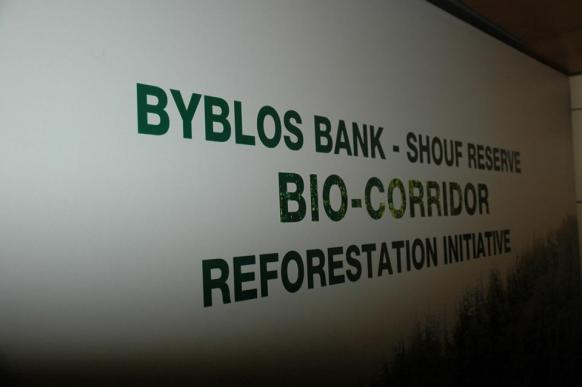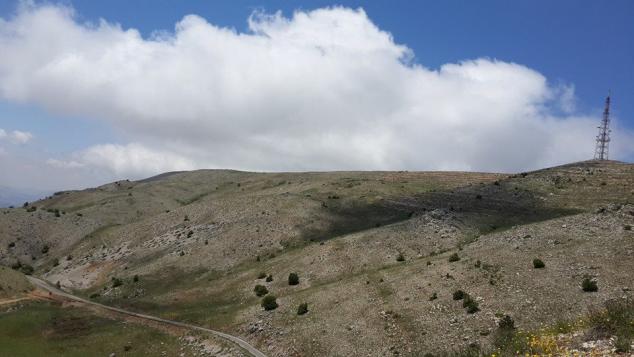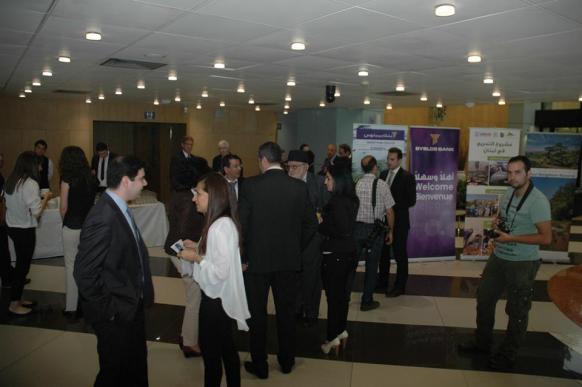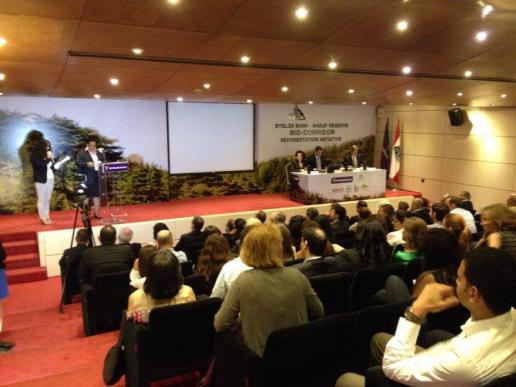






On the occasion of World Environment Day, Byblos Bank announced during a press conference the launching of the “Byblos Bank/Shouf Reserve Bio-Corridor Reforestation Initiative”, in cooperation with the Shouf Biosphere Reserve and Lebanon Reforestation Initiative (LRI – a project funded by USAID and implemented by United States Forest Service).
The Bio-Corridor will consist of 10,000 trees connecting the cedar forests of Barouk and Maasser el Shouf with the oak forests above Ammik, significantly enlarging the forest cover with Cedrus libani and a diversity of other native species. Covering some 15 hectares of arid land currently lacking substantial vegetation, this reforestation effort is important to Lebanon in order to increase its forest cover which, has been degrading due to several factors such as urbanization and forest fires.
Nada Tawil, Head of Group Communication Department at Byblos Bank said: “This initiative is part of our continuous mission to preserve Lebanon’s national symbol and environment while safeguarding our identity at the same time. It is also an endeavor to reverse the latest figures showing that cedar trees now only cover 0.0002% of Lebanese soil. If trees could emit Wi-Fi signals, we would be planting so many trees and we’d probably save the planet also. Too bad they only produce the oxygen we breathe! Byblos Bank has a long record of projects that aim to protect the cedar tree and maintain Lebanon’s stature as the land of the Cedars”.
For his part, Richard Paton, Project Director at the LRI said: “LRI has developed public-private forest funding models that are scalable to donor interests and requirements and meet ecological integrity and necessity. These funding models are based on LRI’s advanced planting protocols and benefit from LRI’s role in building linkages between private sector donors and successful forest practitioners. Byblos Bank embraced this approach with the Shouf bio-corridor project.”
Nizar Hani, Representative of the Shouf Biosphere Reserve said: “Aside from increasing this ecological system’s capacity to face the challenges, the main goals of this project are to increase awareness about the rehabilitation of the ecological system on all levels in cooperation with the municipalities and all local communities. The project also aims to create more job opportunities for locals, including women, through the rehabilitation and maintenance works.” He added: “The Byblos Bank/Shouf Reserve Bio-Corridor connects the western side of the reserve with the Shouf Mountains, increasing biodiversity, supporting ecological processes, promoting sustainable land uses and cultural practices, contributing to water conservation and enhancing landscape resilience to climate change. All restoration work should give priority to the regeneration of the relic cedar forest, the diversification of natural habitats, and the preservation of threatened species.”
The Bio-Corridor will be planted with Cedars as the major species, interspersed with smaller proportions of other trees. The initiative also includes hiring a forest ranger to oversee the reforestation plan, the building of a fence to protect seedlings from grazing, the installation and operation of an irrigation system, and weed management, for a period of three years.
The Byblos Bank’s commitment to Lebanon’s national tree goes back to 2005, when it launched both an unprecedented publicity campaign and a well-conceived cedar planting program alongside the Shouf Biosphere Reserve’s own tree adoption activities.
Today, the reserve’s Byblos Bank Eternal Corner, is home to Cedars planted on behalf of Byblos Bank’s Expatriate Housing Loan clients to bond them forever with their homeland. Over eight years the Bank has planted some 800 Cedars as part of the adoption program at the Byblos Bank’s Eternal Corner, accounting for 26% of the cedar plantings at the reserve.
The Byblos Bank Bio-Corridor Initiative follows a national awareness campaign titled “Our Cedar is our Identity” launched in 2013, and focused on threats to Lebanon’s cedars and efforts to protect them. As soon as the campaign video was posted online under the title “The Lebanese are losing it,” it went viral via the blogosphere and various social media platforms. The YouTube video reached 37,000 views in the first week, making it far and away the most watched bank advertisement in Lebanon – ever. As part of this campaign, Byblos Bank also planted around 3,000 Cedar trees in Ehden, Ehmed, Kfardebian and Zaarour in cooperation with Jouzour Loubnan and Cedar Box.